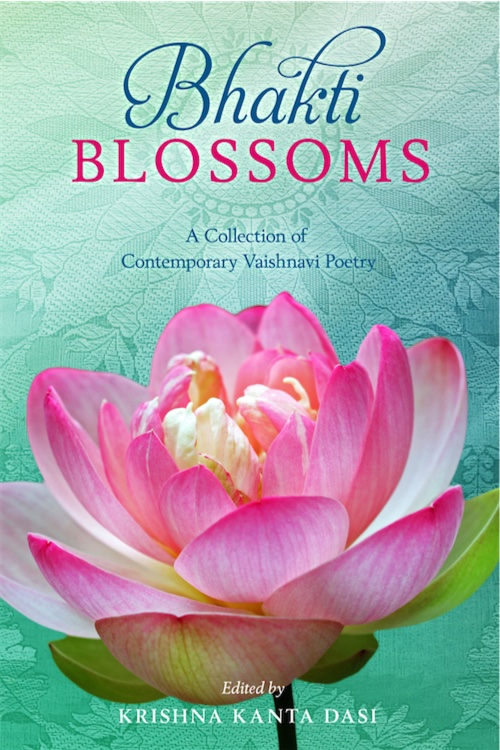A new book is being released this summer featuring the individual voices of 108 women in the Bhakti tradition. Over the last three years, Krishna Kanta Dasi—founder of the Vaishnavi Voices Poetry Project—has been collecting the poetry of vaishnavis, or female practitioners of bhakti, from all over the world to produce Bhakti Blossoms: A Collection of Contemporary Vaishnavi Poetry.
This rare collection of poems offers honest and inspiring glimpses into the spiritual journeys of contemporary women in the Bhakti tradition. Divided into nine rich themes, the book begins with two chapters full of love poems to Krishna, and colorful descriptions of his beauty, compassion, mercy and might. Introduced by Pranada Comtois, author of Wise Love, and Vrinda Sheth, author of Sita’s Fire Trilogy, these first poems often appear to echo the separation and longing sentiments of Lord Chaitanya, Radha and the Gopis, as the poets recount divine lilas, and their own relationships to these sacred pastimes.
Chapters three and four, introduced by Dhyana Rico, (MA. in Marriage and Family Therapy) and Urmila Dasi (Edith Best, Ph.D.,) revolve around the vaishnavis’ relationships with themselves and others, including their bodies, their families, the sangas—or communities they live in—as well as the special relationships they have with their individual gurus. The importance of cultivating an atmosphere of trust, in which real sharing can occur, is emphasized. In Rico’s words: “Whether we are joining together to chant the Maha-Mantra or share spiritually inspiring poetry, it requires a great deal of vulnerability to sit and truly open your heart in this way.”
The fifth chapter presents brave and honest accounts of struggles in the spiritual practices of the poetesses. From existential angst to frustration with the material world, the Maya chapter holds expressions of repentance and remorse, feeling abandoned and fighting demons within. Complete with an insightful introduction by Vishaka Dasi, (author of Five Years, Eleven Months,) it also paints philosophical pictures of the temporary nature of the material realm, time and the concept of a real home. In her words: “the poets remark on both aspects of maya—the delusive one that causes us to suffer the effects of time, as well as the divine one that draws us to Krishna’s transcendent world.”
Bhakti Blossoms book cover by Raghu Consbruck of Ragu Designs.
From struggles we move into vandanam, prayers: after a beautiful introduction by Janavi Held, (author of Letters to My Oldest Friend,) the poets then take us into their personal dialogues with God. We hear of different kinds of praying, from achy surrendering to feeling comforted by divine grace. Like with Queen Kunti, calamities seem to deepen the poets’ connection to Krishna, and adversity is engaged as fuel in sadhana, or spiritual practice. The women’s prayers are gentle and fierce at once, flowing out in tears, sighs, pleas and songs.
Chapter seven is all about sevanam, or service, and begins with an introduction by Braja Sorensen, (author of Lost & Found in India,) in which seva is equated with sanatana-dharma: our eternal religion, or occupation. Here, the broad vision of the vaishnavi poets’ relate to a variety of activities as seva: everything from sweeping the floor, cooking and playing mridanga (drum), to chanting on the streets, mending heart-wounds and learning to love: all activities that can be engaged in the practice of bhakti yoga.
The book’s enticing penultimate chapter overflows with beautiful descriptions of the way the poets’ individual relationships with Nature inspire their love for God. Introduced by Rukmini Walker (activist in interfaith dialogue and women’s empowerment), the eighth chapter illuminates moments of peaceful introspection as snow descends or birds sing, or a monsoon cloud arouses thoughts of Krishna’s complexion. Here, the vaishnavis’ appreciation for the power and beauty of Mother Nature reveals the power and beauty of the Supreme Divinity, Krishna. These sweet conversations with seasons, flowers, rainstorms and sacred rivers offer us a way of seeing Divinity everywhere.
The final poems that appear in the book are all dedicated to the authors’ dynamic relationships to the Holy Names. After a very sweet and personal chapter introduction by Arcana Siddhi Devi Dasi (Family Therapist), the verses soar with poetic narratives about chanting the maha mantra: listening to it, feeling embraced by it, saved by it, healed by it. The vaishnavi poets take us into congregational kirtans as well as private japa sessions, as they illuminate the soothing, transformative and liberating power of chanting Hare Krishna.
Including an illuminating Foreword on the historical value of women’s voices in the bhakti tradition, and a comprehensive glossary by Graham M. Schweig, Ph.D., of Philosophy and Religion at Christopher Newport University, and Distinguished Teaching and Research Fellow at the Graduate Theological Union, Berkeley, the book is written for a wide audience: anyone who loves beautiful poetry and the spiritual journey.
With poetic offerings from the voices of those who have just began a bhakti practice, to seasoned practitioners of several decades, and women who were born into the bhakti tradition, Bhakti Blossoms, certainly offers readers a wide range of perspectives on what it’s like to be a woman today in the Bhakti movement. Equally refreshing is the fact that although the authors come from diverse sangas and gurus, their voices unite harmoniously to celebrate the singular love for Krishna that they all share, inspiring readers to do the same.
This uplifting new book— the first of its kind to publish the combined works of contemporary bhakti yoginis—will be released August 29th, 2017, with Golden Dragonfly Press and be available on Amazon, or Barnes & Noble. For more information, please visit the Vaishnavi Voices Poetry project’s website here or their Facebook page.
Source:https://iskconnews.org/new-book-celebrates-todays-women-in-the-bhakti-tradition,6172/

Comments